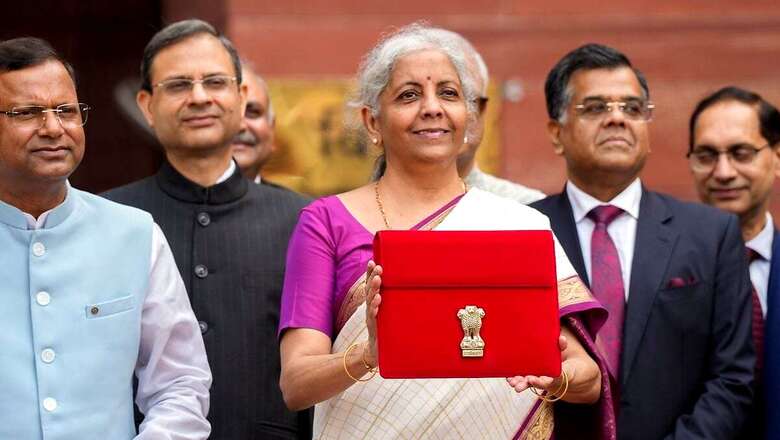
views
The Budget presented on July 23 by Finance Minister Nirmala Sitharaman has been discussed and debated at length by economic experts and politicians on both sides of the spectrum. I am not an economist, but for me one thing is clear: the goal of Viksit Bharat is unachievable until the needs of the bottom of the economic pyramid are effectively dealt with.
This thought is based on a principle of architecture: one needs to have a strong foundation in order to have a super-structure that endures. To design a first floor without investing in a supporting infrastructure on the ground is an architectural fantasy, and this principle applies to economic planning as well. India may well be the world’s fastest-growing economy—and this is something to be proud of—but such achievements cannot be seen in isolation. They need to be juxtaposed with basic questions: growth for whom, prosperity for which segment of society, and the nature of the distributive spread.
India is the fifth largest economy in the world, but in per capita income we are abysmally low—ranked 142 out of 197 countries (2020 figures). The inference is stark: while we are a big economy doing well, the benefits are spread very disproportionately, where at one level there is enviable affluence and at another unacceptable deprivation. Unless we find a solution to this asymmetry, our holistic progress will remain a chimaera on unstable foundations, both economically and politically.
To resolve this contradiction, priority attention must be given to those sectors where the benefits of our economic growth have not percolated to the desired levels. Agriculture constitutes the largest segment at the bottom of the pyramid. It impacts two-thirds of our population, and engages 45.8 per cent of our working force as per 2022-23 figures. However, agriculture growth has declined from 4.7 per cent in FY 23 to 1.4 per cent in FY 24. Has the Budget, and all the endless discussions on it, dwelt sufficiently on this glaringly important data?
There can be no Amrit Kaal in 2047 if not enough is done to bring about a new revolution, akin to the Green Revolution of the 1960s, in the life of farmers, and by extension, in rural India. We have the world’s largest endowment of fertile agricultural land, but our food productivity is very low. China’s rice yield per hectare is almost twice that of ours. That of Vietnam and Indonesia is also much higher.
Agriculture urgently needs an infusion of technology and infrastructure. These include the wider footprint of irrigation (including the water-conserving technology of drip irrigation), better agricultural extension services, new and better seeds, the use of appropriate fertilizers, efficient cooperatives, mechanisation, improved credit services, vastly increased warehouse and cold storage facilities, better road connectivity, crop diversification (including cash-yielding crops), marketing networks, policy stability, and far more effective R&D inputs.
It is not that nothing has been done in these areas by the current or previous governments. But it is clear that neither overall agricultural income nor productivity have significantly benefitted. Most of the budget allocation for agriculture goes for subsidies, such as that for fertilizers and MNREGA. But do they really bridge the gap between the spade and the fork, that is between producers and consumers? Data shows that ultimately such subsidies benefit consumers more.
Moreover, schemes like MNREGA, are palliatives—perhaps necessary given poverty conditions—but not solutions. Again, continuing to provide 800 million people free rations through the PM-Garib Kisan Kalyan Yojna, which was supposedly a temporary measure after COVID, is political populism considering that the government itself claims that 250 million people have been redeemed from below the poverty line in the last ten years.
According to Professor Ashok Gulati, an expert on the agricultural sector, investment in R&D for farming is both critically important and economically sound. As he writes: ‘It is well-known that the marginal returns of investing in agricultural R&D are over ten times—in other words, an investment of Rs 1000 crore will mean a Rs 10,000 crore return in terms of agri-GDP’. However, in the Budget, the allocation for this pivotal area is just marginally higher in monetary terms, and given inflation, it is less.
While infrastructure projects are important—and the Budget allocation for them is high—an equal amount of money should have been given to the food processing sector. Unless we add value to farm products through an accessible and pervasive network of food processing industries, agricultural incomes will continue to stagnate or fall. Much of such industrial investment can be designed to be labour-intensive, thereby providing employment to unemployed and under-employed farmers.
Similarly, I don’t see why the government cannot agree to some form of negotiated Minimum Support Price (MSP), which incentivizes crop diversification and assures farmers of basic income support. Such assistance is given in many forms to the industrial and manufacturing sectors. The short point is that higher agricultural incomes have great spin-off effects on the overall economy. Rural India is one of the biggest consumer markets for a whole range of goods: fans, lights, motorcycles, tractors, cosmetics, detergents, clothing, and footwear. Greater disposable income with farmers means a widening of the market, and therefore a tool to boost demand.
It is time for our policymakers to move away from endless discussions on capital gains tax, and discuss foundational reform that affects the lives of the maximum number of our people. Agriculture, health and education are three major priorities here. The rich cannot secede to form their own Republic. The poor—the majority of them in the rural hinterland—must be given their due.
The author is a former diplomat, an author and a politician. Views expressed in the above piece are personal and solely those of the author. They do not necessarily reflect News18’s views.




















Comments
0 comment